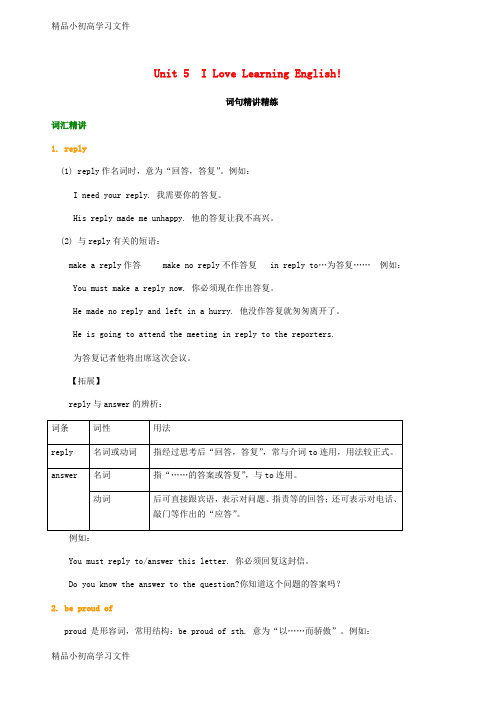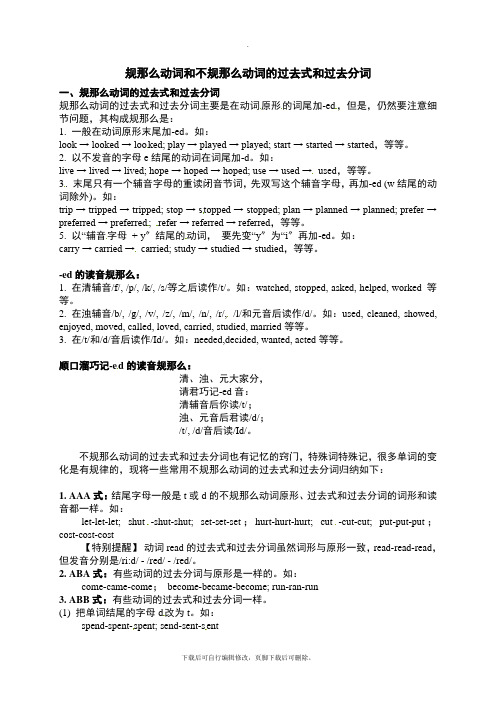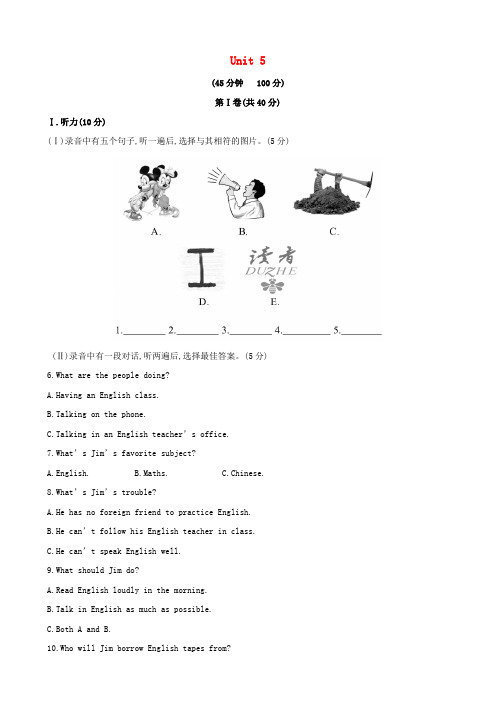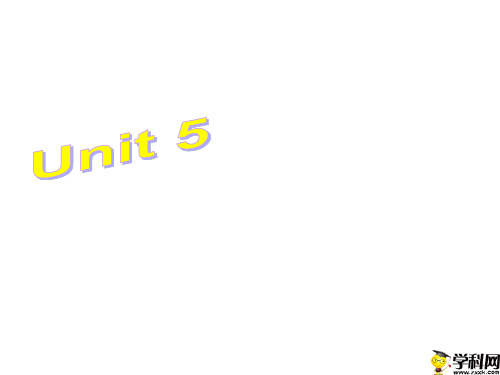七年级英语下册 Unit 5 I Love Learning English Lesson 26 Online Phone Calls课后作业B 冀教版
- 格式:doc
- 大小:25.51 KB
- 文档页数:4

Unit 5 I Love Learning English!词句精讲精练词汇精讲1. reply(1) reply作名词时,意为“回答,答复”。
例如:I need your reply. 我需要你的答复。
His reply made me unhappy. 他的答复让我不高兴。
(2) 与reply有关的短语:make a reply作答 make no reply不作答复 in reply to…为答复……例如: You must make a reply now. 你必须现在作出答复。
He made no reply and left in a hurry. 他没作答复就匆匆离开了。
He is going to attend the meeting in reply to the reporters.为答复记者他将出席这次会议。
【拓展】reply与answer的辨析:例如:You must reply to/answer this letter. 你必须回复这封信。
Do you know the answer to the question?你知道这个问题的答案吗?2. be proud ofproud 是形容词,常用结构:be proud of sth. 意为“以……而骄傲”。
例如:I am very proud of being a Chinese. 作为一名中国人我很自豪The young should be proud of their own culture.年轻人应该以他们自己的文化而自豪。
【拓展】(1) be proud to do sth 意为“为做某事而骄傲”。
例如:We are proud to be a league member. 我们为成为团员而骄傲。
(2) pride是名词,意为“骄傲,自豪”。
常用的结构: take pride in sth. 意为“为某事骄傲”。


规那么动词和不规那么动词的过去式和过去分词一、规那么动词的过去式和过去分词规那么动词的过去式和过去分词主要是在动词原形的词尾加-ed,但是,仍然要注意细节问题,其构成规那么是:1. 一般在动词原形末尾加-ed。
如:look → looked → loo ked; play → played → played; start → started → started,等等。
2. 以不发音的字母e结尾的动词在词尾加-d。
如:live → lived → lived; hope → hoped → hoped; use → used →used,等等。
3. 末尾只有一个辅音字母的重读闭音节词,先双写这个辅音字母,再加-ed (w结尾的动词除外)。
如:trip → tripped → tripped; stop → s topped → stopped; plan → planned → planned; prefer → preferred → preferred; refer → referred → referred,等等。
5. 以“辅音字母+ y〞结尾的动词,要先变“y〞为“i〞再加-ed。
如:carry → carried →carried; study → studied → studied,等等。
-ed的读音规那么:1. 在清辅音/f/, /p/, /k/, /s/等之后读作/t/。
如:watched, stopped, asked, helped, worked 等等。
2. 在浊辅音/b/, /g/, /v/, /z/, /m/, /n/, /r/,/l/和元音后读作/d/。
如:used, cleaned, showed, enjoyed, moved, called, loved, carried, studied, married等等。
3. 在/t/和/d/音后读作/Id/。
如:needed,decided, wanted, acted等等。


Unit 5(45分钟 100分)第Ⅰ卷(共40分) Ⅰ.听力(10分)(Ⅰ)录音中有五个句子,听一遍后,选择与其相符的图片。
(5分)(Ⅱ)录音中有一段对话,听两遍后,选择最佳答案。
(5分)6.What are the people doing?A.Having an English class.B.Talking on the phone.C.Talking in an English teacher’s office.7.What’s Jim’s favorite subj ect?A.English.B.Maths.C.Chinese.8.What’s Jim’s trouble?A.He has no foreign friend to practice English.B.He can’t follow his English teacher in class.C.He can’t speak English well.9.What should Jim do?A.Read English loudly in the morning.B.Talk in English as much as possible.C.Both A and B.10.Who will Jim borrow English tapes from?A.Miss Green.B.His English teacher.C.His friends.Ⅱ.单项填空(10分)1.—Hello, may I speak to Sandy?—.A.Yes,I’m RoseB.I’ll call back againC.Yes,I ca n’t hear youD.Yes.This is Sandy speaking2.—Where is Sally from, Mike?—.A.I am from ChinaB.She is from AmericaC.He is from EnglandD.You are from Japan3.—will you stay in Beijing?—For a week.A.How farB.How longC.How soonD.How old4.—Who taught you French?—Nobody. I learned it by .A.myselfB.myC.meD.mine5.—Look! Cathy is running around the playground.—It be her. She has gone to the gym.A.can’tB.mustn’tC.needn’tD.may not6.—Can you tell me how to use the digital camera?—.Let me have a look.A.No wayB.No problemC.Forget itD.Yes,please7.It was lovely weather we decided to spend the day on the beach.A.such a;thatB.such;thatC.such;asD.so;that8.—Excuse me, can you tell me the meaning of “connect”?—Sorry, I don’t know. You can in a dictionary.A.look it upB.look up itC.look it forD.look for it9.Li Lei is not good at English. I think she needs it every day.A.practice to speakB.to practice speakingC.practice speakingD.practice speak10.It took Janet three hours reading this interesting story.A.to finishB.finishedC.finishingD.finishⅢ.完形填空(10分)The best way of 1 a language is always using it. The best wayof learning spoken English is reading in English as 2 as possible.Sometimes you’ll get your words mixed up and people will not 3 you.Sometimes people will 4 things too quickly and you can’t understand them. But 5 you keep your sense of humor, you can always have a good laugh at the mistake you 6 .Don’t be unhappy if people seem to be laughing 7 your mistakes. It’s8 for people to laugh at your mistakes than be angry with you, 9 they don’t understand what you are saying. The most important thing for learning Engl ish is: Don’t be10 of making mistakes because everyone makes mistakes.1.A.learnt B.learn C.learning D.to learn2.A.much B.many C.a lot D.a few3.A.like B.know C.understand D.learn4.A.say B.tell C.speak D.talk5.A.if B.since C.although D.that6.A.have B.make C.produce D.are7.A.at B.on C.for D.to8.A.good B.better C.well D.best9.A.unless B.because C.as long as D.if10.A.worry B.unhappy C.afraid D.happyⅣ.阅读理解(10分)A student is learning to speak British English. He wonders: Can I communicate with Americans? Can they understand me? Learners of English often ask: What are the differences between British English and American English? How important are these differences?Certainly, there are some differences between British English andAmerican English. There are a few differences in grammar. For example, speakersof British English say “in hospital” and “Have you a pen?” while speakersof American English say “in the hospital” and “Do you have a pen?”.Pronunciation is sometimes different. Americans usually sound the /r/ in wordslike “bird” and “hurt”. Some speakers of British English do not sound the /r/ in these words.There are differences between British English and American English in spelling. For example, “colour” and “honour” are British English while “color” and “honor” are American English.These differences in grammar, pronunciation and spelling, are not important, however. For the most part, British English and American English are the same language.1.Are there any differences between British English and American English?A.No, there are n’t any differences between them.B.Yes, there are some differences between them.C.Yes, there are many differences between them.D.Sorry, I don’t know.2.The expression “in hospital” is used in.A.British EnglishB.American EnglishC.both British English and American EnglishD.neither British English nor American English3.Do Americans say “Have you a ruler?”?A.Yes,they do.B.No,they don’t.C.Maybe,I am not sure.D.We don’t know.4.Is the word “color” American English?A.Yes,it is.B.No,it isn’t.C.It’s neither American English nor British English.D.It’s either American English or British English.第Ⅱ卷(共60分)Ⅴ.词汇运用(20分)(Ⅰ)根据句意及首字母提示完成单词。

七年级英语下册Unit 5 I Love Learning English!单元测试Ⅰ.单项选择(共10小题;每小题2分,满分20分)1.—What is your sister doing?—She is writing ________ article about animals.A.a B.an C.the D./2.—Hi, Bob. How was your party yesterday?—Wonderful! I had a big meal and enjoyed ________.A.you B.myself C.yourself D.me3.—As parents, do you know how to educate(教育) your children well?—We must learn to communicate ________ them first.A.and B.to C.with D.on4.My mother is great. I am proud ________ her.A.with B.of C.at D.for5.—Does your little brother often do the housework at home?—No, never. He is a ________ boy.A.lazy B.clever C.strong D.quick6.Keep quiet, everyone! Let me ________ my friend to you.A.pass B.connect C.speak D.introduce7.—Hello, may I speak to Sandy?—Yes, ________A.who are you? B.I'm Sandy.C.who's that? D.I'm here.8.The girl is afraid ________ home alone.A.stay B.stays C.staying D.to stayfor half an hour every morning. I have a 32.f________ friend. She is a 33.________ (Canada) girl. We speak English online 34.________ (two) a week. At first, we couldn't understand each other. 35.________ later we had a good talk.Ⅵ.基础写作(满分30分)A)连词成句(共5小题;每小题2分,满分10分)36.understand, you, the, did, now, sentence, just________________________________________________________________________?37.he, to, introduces, a, friend, new, me________________________________________________________________________.38.you, talk, him, loudly, to, shouldn't________________________________________________________________________.39.a, friend, you, helpful, are, such________________________________________________________________________.40.laugh, others, don't, at________________________________________________________________________!B)书面表达(满分20分)请以“How to Speak English Well”为题写一篇英语短文,60词左右。
Unit 5过关测试限时:60分钟满分:100分一、单项选择(每小题1. 5分,共15分)1. I can't believe ________a little bird can eat________ much food.A. so; soB. such; suchC. so; suchD. such; so2. Many students write to Language Doctor to________ advice about learning English.A. look throughB. ask forC. give upD. worry about3. I need to send many old ________to my grandpa in the village.A. newsB. magazineC. photoD. newspapers4. —Is the film interesting?—I thought it would be. But ________,it's very boring.A. in allB. in factC. in a hurryD. in future5. —Wow, your sweater is very beautiful!—Thank you. I bought it two days ago. It ________ me $50.A. tookB. costC. paidD. spent6. Your parents will________ you if you study hard and get good grades at school.A. are proud ofB. be proud ofC. take prideD. take proud in7. Do you often make________ in grammar?A. mistakeB. mistakesC. some mistakesD. a few mistake8. Teachers should ______better ______ their students.A. communicate; withB. communicate; toC. to communicate; withD. communicated; by9. Please connect the phone ______the computer.A. atB. intoC. ofD. to10. Can you ________the star singer ________us?A. introduce; toB. introduces; toC. introduce; withD. introduces; with二、完形填空(每小题1. 5分,共15分)You may think that English dictionaries have been used for many, many centuries. In fact, an English dictionary you ________11 today wasn't made until the Qing Dynasty (清朝). Three men did most of the important ________12work on dictionaries. They spent nearly all their lives trying to ________13words for their dictionaries. For them, it was a wonderful journey. The largest dictionary in the world is the Oxford English Dictionary. The________14for this dictionary came from an important meeting in Britain in 1857. Twenty - two years later, Oxford University asked James Murray to be the editor of its new dictionary.Murray had never been to________15. At the age of fourteen, he lefthis village school in Scotland and taught himself while working in a bank.________16he became a great teacher. After Oxford gave him the job,Murray had a small house ________17in his garden to do the work. Everymorning, Murray got out of bed at five o'clock and ________18in the small house several hours before breakfast. Often he would work into the night. Murray hoped to finish the new dictionary in ten years. But after five years, he was ________19 adding (增加) words for the letter “A”! He worked on the dictionary ________20he was very old.Forty - four years later, in 1928, other editors finished the dictionary.11. A. write B. use C. copy D. miss12. A. easy B. boring C. early D. dangerous13. A. spell B. collect C. invent D. make14. A. way B. use C. idea D. prize15. A. school B. cinema C. village D. college16. A. Ever since B. Before C. So far D. Later17. A. built B. sold C. broken D. drawn18. A. read B. wrote C. worked D. thought19. A. already B. still C. usually D. always20. A. if B. because C. until D. since三、阅读理解(每小题3分,共15分)Zhao Xing's BlogHi, I'm Zhao Xing from Beijing. My English is not very good. There will be an English competition next month. I feel very nervous and I don't know how to improve my English. I think I'm going mad! So I need some help now! Any good suggestions?Amy, ChinaHi, Zhao Xing! I know how you're feeling. There must be many people like you. Why don't you get together and start an English club? You can talk to each other about your English study and your worries. It's a great way to improve your English and enjoy yourself!Daniel, SpainIt's a good idea to read English newspapers. There is China Daily, isn't there? Get your notebook out and write down the new words!Sam, AustraliaHow about getting a pen pal? I'd be happy to be yours. We can send each other e-mails. Good luck with your competition. Take a deep breath (深呼吸),smile and you'll feel better!21. Who is asking for help?A. Zhao Xing.B. Amy.C. Daniel.D. Sam.22. What does the underlined word “mad” mean in Chi nese?A. 羞涩的B. 害怕的C. 发疯的D. 伤心的23. What's Amy's suggestion?A. Starting an English club.B. Reading English newspapers.C. Getting a pen pal from an English - speaking country.D. Talking with friends in English by phone.24. Where does Daniel come from?A. China.B. Spain.C. Australia.D. Canada.25. Which of the following is TRUE?A. Zhao Xing will have an English competition next week.B. Zhao Xing and Amy are both Chinese.C. Daniel thinks watching English movies is a good way to improve English.D. Sam would like to be Zhao Xing's teacher.四、任务型阅读(每小题3分,共15分)Reading an English newspaper is a good way to improve astudent's language ability. As there are many useful and commonwords in an English newspaper, it may help students increasetheir vocabulary(词汇量)and improve their reading skills. Theycan learn new knowledge from newspapers. But what is theproper way to read an English newspaper? Do students need to look over all the content(内容)ofthe newspaper?The first step is to choose a right newspaper with good language. Then turn to the front page and read the headlines(标题)to know what has happened. As the most important things are put on the front page, it's easy to find out what you're interested in and then turn to the page to read it completely. There is no need to go through all the articles.Secondly, read newspapers every day. Remember words through the context(上下文), in which these words may appear repeatedly. Once they appear several times, you will remember them easily. Don't look up every unknown word in your dictionary. You can try to guess the meaning between sentences. If your guess is wrong, don't give up. Keep reading, and you will become familiar with the words after reading them several times in different texts.Reading English newspapers makes us knowledgeable. It can not only help us know what is happening in the world but also improve our language.26~27题完成句子; 28题简略回答问题; 29题找出并写下本文的主题句; 30题将文中画线句子译成汉语。
Online Phone Calls基础巩固练Ⅰ. 根据句意及汉语提示填空1. I'll move to ________(俄罗斯). I will get a new job there.2. I am waiting for your ________(回复).3. Tom won first place in the English ________(比赛).4. Zhao Jun does well in all his subjects. His parents are very ________ (自豪的) of him.5. It is ________(如此的)an interesting story. We all like reading it.Ⅱ. 单项选择6.—I will try my best to win in the School Talent Show.—If so, all of us will be ________ you.A. proud ofB. careful withC. strict withD. worried about7. I have some good news ________ you, Mum.A. inB. forC. withD. off8. ________ her husband, she has now bee a famous film star.A. BecauseB. Thanks toC. Thanks forD. With the help9. —How about seeing a movie this weekend?—________. See you this weekend.A. Well doneB. e onC. Guess whatD. Sounds great10.—Mum, can I do ________ much work in ________ a short time?—Dear, I think you can.A. so; soB. such; soC. so; suchD. such; suchⅢ. 按要求完成句子11. Li Ming is from Shijiazhuang. (改为同义句)Li Ming ________ ________ Shijiazhuang.12. I won a trip to America. (对画线部分提问)________ did you ________?13. I could do it by myself. (改为否定句)I ________ do it by myself.14. We take pride in his good work. (改为同义句)We ________ ________ ________ his good work.15. can't, to, meet, wait, Tommy, you, I(连词成句)_______________________________________________________.综合提升练Ⅰ. 用方框中所给单词或短语的适当形式填空1. Can you ________ me ________ my English?2. I asked him many questions but he didn't give me a________.3. Jessica es from Canada. She is a ________.4. There will be a swimming ________ next month.5. Are you ________ ________ your school?Ⅱ. 用所给词的适当形式填空6. ________(ride) a bike to school is good for your health.7. I want ________(open) the present.8. Lily is the ________(one) to get to school.9. You did the hard work ________(you).10. The news ________(be) very exciting.Ⅲ. 单项选择11.—Chinese astronauts(宇航员)can also walk in space now.—Yes, they're ________ our nation.A. proud toB. pleased withC. the pride ofD. known for12. I can't wait ________ the winner!A. for seeB. seeC. to seeD. to be seen13. The news ________very interesting! Tell me more!A. isB. areC. wereD. be14. —Could you give me some________, Tim?—Sure.A. helpsB. helpC. helpingD. helped15. —Mum, I won first place in the petition.—________A. What for?B. Good for you!C. Thanks!D. That's nothing!Ⅳ. 根据汉语完成句子16. 在昨天的演讲比赛中, 我赢得了第一名。
I won ________ ________in the speech contest yesterday.17. 你确实进步了很多。
You really ________ ________ ________.18. 干得好, 同学们!________ ________ ________, boys and girls!19. 多亏你的帮助, 我们都通过了考试。
________ your help, we all passed the exam.20. 所有的中国人都为我们的成就而骄傲。
All the Chinese people ________ ________ ________ our achievements. Ⅴ. 完形填空(词数:约130;建议用时:5分钟)Singing songs is fun. But is it __21__for learning English? A foreign teacher Joe thinks singing songs is the most useful way for students to learn pronunciation(发音). And students can learn some new words __22__the same time. Joe__23__songs to help him learn some languages like French, Spanish, Japanese and Chinese. So we can__24__the same thing.I think singing English songs is__25__useful and interesting. Singing songs can help students__26__English better and they are happy to learn more and more.Some__27__in the songs are not everyday English, so the teacher should be careful(仔细的)when using the lyrics(歌词)to teach students. The teacher should make the words__28__to remember. When students can sing the song__29__looking at the lyrics, they learn__30__. They will never forget it!21. A. bad B. lazy C. useful D. quick22. A. at B. in C. on D. for23. A. asks B. hopes C. wants D. uses24. A. make B. do C. learn D. teach25. A. both B. all C. between D. each26. A. say B. tell C. speak D. talk27. A. letters B. numbers C. questions D. words28. A. loud B. easy C. difficult D. proud29. A. with B. without C. for D. from30. A. something B. anything C. nothing D. everything答案基础巩固练Ⅰ. 1. Russia 2. reply3. petition4. proud5. suchⅡ. 6. A 7. B8. B 点拨:because意为“因为”, 后面跟从句;thanks to意为“由于;幸亏”,后面跟人或物;thanks for意为“因为……而感谢”;with the help后面应该跟of, 意为“由于……的帮助”。
根据句意“幸亏她的丈夫, 她现在才成了著名的影星。
”可以判断用thanks to。
所以选择答案B。
9. D 10. CⅢ. 11. es from 12. What;win13. couldn't 14. are proud of15. Tommy, I can't wait to meet you综合提升练Ⅰ. 1. help;with 2. reply 3. Canadian 4. petition 5. proud ofⅡ. 6. Riding 7. to open 8. first 9. yourself 10. isⅢ. 11. C 点拨:the pride of意为“……的骄傲”, 符合句意“——中国宇航员现在也能在太空行走了。
——是的, 他们是我们国家的骄傲。